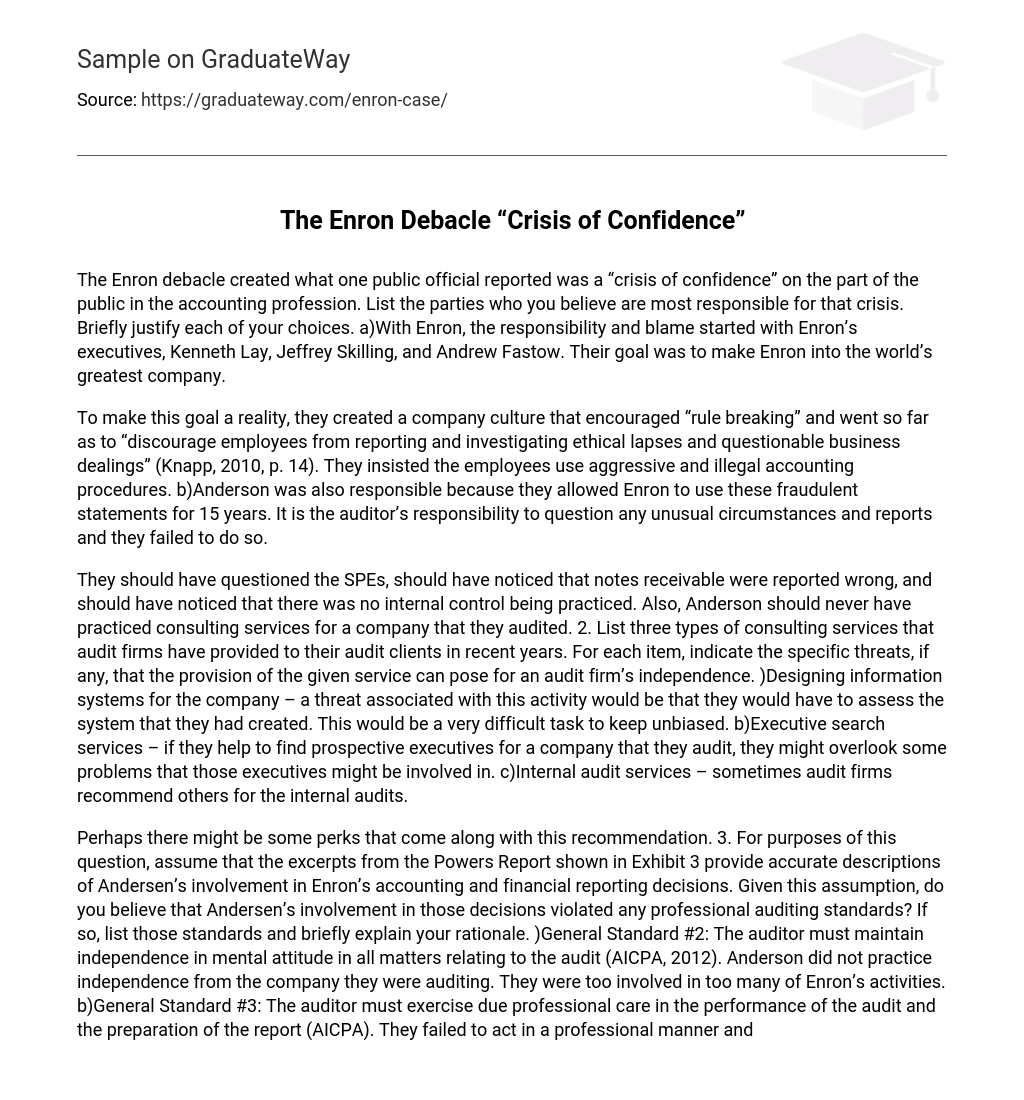The Enron debacle created what one public official reported was a “crisis of confidence” on the part of the public in the accounting profession. List the parties who you believe are most responsible for that crisis. Briefly justify each of your choices. a)With Enron, the responsibility and blame started with Enron’s executives, Kenneth Lay, Jeffrey Skilling, and Andrew Fastow. Their goal was to make Enron into the world’s greatest company.
To make this goal a reality, they created a company culture that encouraged “rule breaking” and went so far as to “discourage employees from reporting and investigating ethical lapses and questionable business dealings” (Knapp, 2010, p. 14). They insisted the employees use aggressive and illegal accounting procedures. b)Anderson was also responsible because they allowed Enron to use these fraudulent statements for 15 years. It is the auditor’s responsibility to question any unusual circumstances and reports and they failed to do so.
They should have questioned the SPEs, should have noticed that notes receivable were reported wrong, and should have noticed that there was no internal control being practiced. Also, Anderson should never have practiced consulting services for a company that they audited. 2. List three types of consulting services that audit firms have provided to their audit clients in recent years. For each item, indicate the specific threats, if any, that the provision of the given service can pose for an audit firm’s independence. )Designing information systems for the company – a threat associated with this activity would be that they would have to assess the system that they had created. This would be a very difficult task to keep unbiased. b)Executive search services – if they help to find prospective executives for a company that they audit, they might overlook some problems that those executives might be involved in. c)Internal audit services – sometimes audit firms recommend others for the internal audits.
Perhaps there might be some perks that come along with this recommendation. 3. For purposes of this question, assume that the excerpts from the Powers Report shown in Exhibit 3 provide accurate descriptions of Andersen’s involvement in Enron’s accounting and financial reporting decisions. Given this assumption, do you believe that Andersen’s involvement in those decisions violated any professional auditing standards? If so, list those standards and briefly explain your rationale. )General Standard #2: The auditor must maintain independence in mental attitude in all matters relating to the audit (AICPA, 2012). Anderson did not practice independence from the company they were auditing. They were too involved in too many of Enron’s activities. b)General Standard #3: The auditor must exercise due professional care in the performance of the audit and the preparation of the report (AICPA). They failed to act in a professional manner and to practice due care when they violated any of the standards. )Field Work Standard #2 : The auditor must obtain a sufficient understanding of the entity and its environment, including its internal control, to assess the risk of material misstatement of the financial statements whether due to error or fraud, and to design the nature, timing, and extent of further audit procedures (AICPA). Enron had no procedure for internal controls. Therefore, Anderson could not have sufficient understanding of the internal controls. d)Reporting Standard #3: When the auditor determines that informative disclosures are not reasonably adequate, the auditor must so state in the auditor’s report (AICPA).
The disclosures and notes that Enron provided were “obtuse, did not communicate the essence of the transactions completely or clearly, and failed to convey the substance of what was going on” (Knapp, 2010, p. 17). Anderson should have stated this problem in their reports. References AICPA. (2012, August 13). Generally Accepted Auditing Standards. Retrieved October 28, 2012, from AICPA. org: http://www. aicpa. org/Research/Standards/AuditAttest/DownloadableDocuments/AU-00150. pdf Knapp, M. (2010). Contemporary Auditing: Real Issues and Cases. Mason: Cengage Learning.





